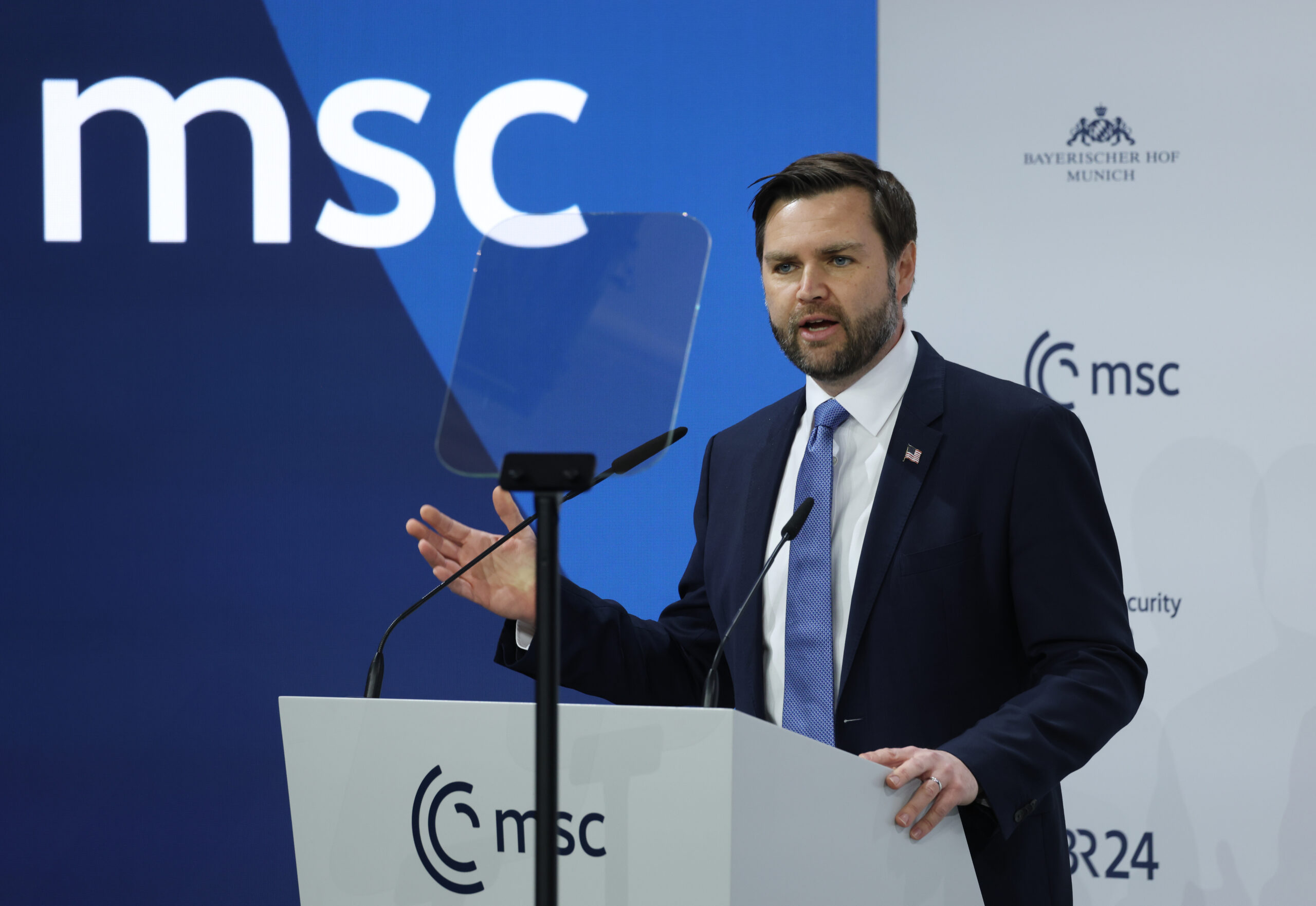Vance on Knife’s Edge
Prioritizing peace among the warmongers.

President Lyndon B. Johnson, the most vulgar—second-most vulgar?—occupant of the White House, used to boast that he kept Vice President Hubert Humphrey’s “pecker in my pocket.”
The Hump was a Cold War liberal who nevertheless expressed reservations about the U.S. role in Vietnam in a memo to Johnson in 1965. He didn’t make that mistake again. HHH would spend the next three years disgorging bilge about the need for Americans to display the “patience to work and bleed and die 5,000 miles from home.” Chasing Richard Nixon in the fall of 1968, Humphrey haltingly reestablished a measure of independence, but it was too late to save his campaign.
Watching Vice President J. D. Vance, whose Senate voting record placed him squarely in that chamber’s small but doughty war-skeptical bloc, play the company man, publicly defending an Iran bombing of which he surely disapproved in private, one winced at the thought of another phallectomy.
But perhaps I am jumping the gun. If Vance really is made of the Appalachian grit he assayed in Hillbilly Elegy, he will break, much sooner than Humphrey did, with his unstable boss. (I’m talking principled defiance, not resignation. In Woodrow Wilson’s unwontedly humorous asseveration, “There is very little to be said about the Vice President. . . . His importance consists in the fact that he may cease to be Vice President.” Which is the case against quitting.)
Vance, unlike his unprepossessing predecessors Pence and Harris, is a rara avis in American politics: an intellectual, a talented writer, and a man with impelling affection—so it appears—for a place. Since the exigencies of politics and the job description of a second banana militate against intellectual integrity, good prose, and most of all loyalty to place, Vance’s current situation is triply interesting. Devils—one Ambition, the other Power—are whispering in each ear, and one wonders if these will drown out the echoes of Jackson, Kentucky, which he claims as his spiritual home in Hillbilly Elegy.
I had a parti pris against Hillbilly Elegy before reading it. From reviews, I was given to understand that Vance professed to have been “rescued” from his violence-prone family in a hardscrabble southern Ohio town by three institutions: the standing army, Yale Law School, and Silicon Valley, each of which I believe to be a significant contributor to the destruction of local life, regional vitality, and the health (or even existence) of the American Republic.
This interpretation of Hillbilly Elegy is not without merit, but nor is it sufficient. For one thing, Vance’s policy prescriptions, which came off as standard-issue conservative in 2016, consume only the dozen or so worst pages in Hillbilly Elegy, and for another, his political views have evolved substantially in the decade since its publication. (Thank God: Vance actually voted in 2016 for independent candidate Evan McMullin, the glabrous front man for the national security state whose resume proudly boasted of his service to the CIA and Goldman Sachs.)
But Vance moved back to Ohio in 2017, and something seems to have clicked. Healthy familial sentiment pushed his politics in a populist direction, and a trace of that most un-Mamaw-like patrician Buckeye statesman, Senator Robert Taft, “Mr. Republican,” worked its way into Vance’s foreign policy views.
When, in the Great Debate of 1950–51, defenders of the Old Republic desperately warned their countrymen against committing U.S. ground forces to Europe or Asia, Taft stated, “The principal purpose of the foreign policy of the United States is to maintain the liberty of our people. Its purpose is not to reform the entire world or spread sweetness and light and economic prosperity to peoples who have lived and worked out their own salvation for centuries, according to their customs, and to the best of their abilities.”
Appeasing traitor!
Subscribe Today
Get daily emails in your inbox
The anarchist in me scoffs that I’m a fool to repose a measure of trust in any politician, but folks I respect who know Vance well speak highly of him, so I give him the benefit of the doubt. I also like his use of Merle Haggard’s “America First” as his GOP convention theme music and the fact that the War Party hates and fears Vance and will do whatever it can to sink his inevitable 2028 campaign.
Besides, his ancestral Bluegrass State supplied three Republican doves in the Vietnam debate (Senators John Sherman Cooper and Thruston Morton and Rep. Eugene Siler) and today boasts the praiseworthy pair of Sen. Rand Paul and Rep. Thomas Massie—or “TOTAL LOSERS!” in Trumpian tweetese.
May Mamaw, Bob Taft, and the Kentuckians supply the necessary courage to one of the most interesting national political figures of recent years. There will be more impulsive bombings, idiotic tweets, and autocratic gestures to test his mettle and challenge his honor. Let us hope, for Vice President Vance’s sake and ours, that he guards the family jewels.